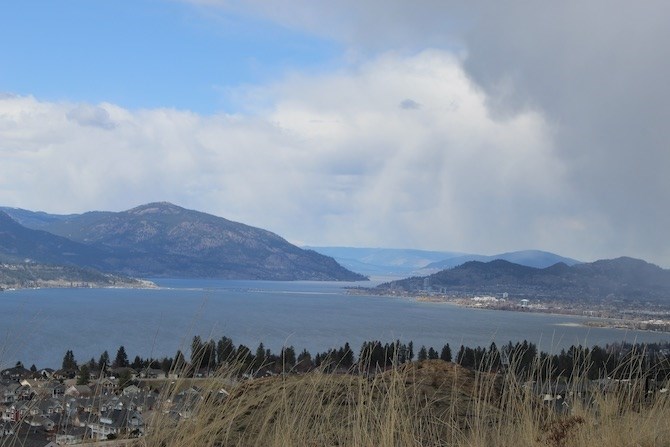
15 years later, it's more than a lake that separates Kelowna and West Kelowna.
(ROB MUNRO / iNFOnews.ca)
July 23, 2022 - 12:21 PM
After three failed attempts over 20 years, residents living on the Westside of Okanagan Lake finally voted to incorporate in 2007.
That vote, 15 years ago as of June 16, was overwhelmingly in favour of changing from a regional district area to a municipality with 84% in favour but the community was divided on how it wanted to do that — form it's own city or join Kelowna.
51.1% chose to become their own municipality.
“I do think it was the right decision,” Sharon Shepherd, who was Kelowna's mayor at the time and favoured amalgamation, told iNFOnews.ca this week.
That’s not how she felt at the time. Nor did the vast majority of Kelowna council members who voted 7-1 in favour of amalgamation, prior to the Westside vote.
The no vote on Kelowna council came from current Kelowna-Lake Country MLA Norm Letnick who, according to news reports at the time, argued that Kelowna should hold a referendum on the issue first.
“At the time, we were disappointed,” Shepherd said. “We were much smaller then and we could visualize that we could handle it.”
Kelowna’s Boundary Extension Review Team estimated that the average Kelowna taxpayer would only pay about $16 per year extra in taxes if amalgamation had gone through.
Since the Westside was unincorporated it would not have been a true amalgamation but an extension of Kelowna’s boundary.
The thinking at the time was that Kelowna had skilled staff who could jump in and quickly help with the infrastructure needs of the new municipality, Shepherd said.
The province was going to kick in $7.125 million in “restructure assistance” funding and pay for police and road maintenance for a five-year transition period. Kelowna was prepared to have seats on council guaranteed for Westside residents.
While there were strong opinions on both sides of the incorporation debate on the Westside, one of the most divisive battles was a 2009 vote to pick a name for the new municipality.
While 82% of residents agreed the name should be changed from Westside, only 48% choose West Kelowna, leaving some Westbank residents seriously upset.
READ MORE: West Kelowna: The name that divided a community
That division seems to have healed.
In the lead-up to the 2018 municipal election, the Kelowna Daily Courier asked all West Kelowna candidates if they would support a reconsideration of amalgamation.
“Seriously?” is the way council candidate Rusty Ensign responded, echoing the sentiment expressed by all the candidates. They were all strongly in favour of continuing as their own city.
Shepherd told iNFOnews.ca that she had recently been talking to someone about what it might be like today if it had become one big city.
“Both communities have just grown substantially,” she said. “I was thinking about how difficult it would be to really keep on top of all the needs on two sides of the lake. Geographically, I think we are separate enough to warrant separate municipalities.”
That being said, things could have been done differently to ease the transition for West Kelowna.
“Maybe sharing would have been a better option,” Shepherd said. “At the regional district, that dialogue should have taken place. If there was a need to look for engineering help, for example, or whatever it was, that could maybe have been done better.”
Things like transit, garbage collection, emergency services and regional parks are already managed on a regional basis.
There is now a regional transportation plan in place and Lake Country, Okanagan Indian Band and the City of Kelowna recently signed an agreement on sharing things like water and sewer services in the industrial area joining the three jurisdictions.
READ MORE: Rail Trail guaranteed to run through OKIB lands with historic new agreement
Shepherd isn’t advocating for one big city but did agree things like staffing in multiple communities does have an impact on taxes.
And, along with regionally shared services, Statistics Canada refers to the Central Okanagan regional district as the Kelowna Census Metropolitan Area.
It was the fastest growing such area in Canada during the 2016-21 census period and had a population of 222,162 in 2021.
If it amalgamated into one city, that would make it B.C.’s fourth largest city behind Burnaby (232,755) Surrey (568,322) and Vancouver (662,248).
Right now Kelowna, with 144,576 people within city boundaries, is the seventh largest city in B.C., falling below Coquitlam (148,625), Abbotsford (153,524) and Richmond (209,937).
To contact a reporter for this story, email Rob Munro or call 250-808-0143 or email the editor. You can also submit photos, videos or news tips to the newsroom and be entered to win a monthly prize draw.
We welcome your comments and opinions on our stories but play nice. We won't censor or delete comments unless they contain off-topic statements or links, unnecessary vulgarity, false facts, spam or obviously fake profiles. If you have any concerns about what you see in comments, email the editor in the link above.
News from © iNFOnews, 2022